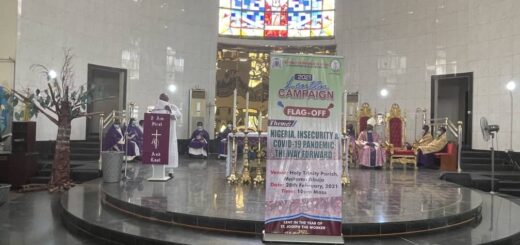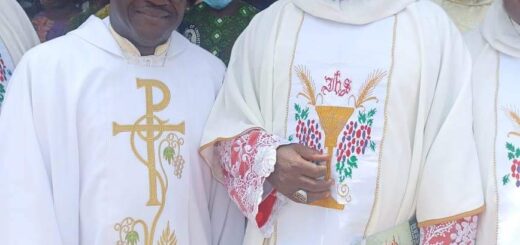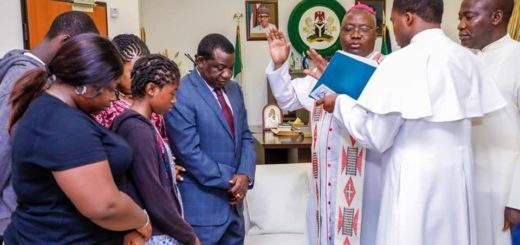Parable of the Prodigal So: What are the lessons for us today?
by ARCH BISHOP · March 27, 2022
Fourth Sunday of Lent, Year C, at Our Lady Help of Christians, Dagba Outstation, Garki, Abuja, March 27, 2022. Homily by archbishop I. A. Kaigama.
Readings: Jos. 5: 9-19; Ps. 33: 2-7; 2. Cor. 5:17-21; Lk. 15: 1-3, 11-32
Laetare (Rejoice)
I find myself in your outstation church today purely by divine providence. I was supposed to have travelled to Taraba State yesterday for a peace conference, but due to flight issues, I could not travel. I did not know that God was preparing me to make an unplanned visit to your outstation of Our Lady Help of Christians, Dagba. I am happy to see you and to pray with your small community, made up of internally displaced persons (IDPs) from the North East and other residents of this locality. God bless you all.
Halfway into Lent, we are enjoined during this fourth Sunday to rejoice. In whom or in what should do we rejoice? The Church asks us to rejoice in the love and mercy of God whose arms are always open to welcome us back to Himself especially, and also, Easter, the day of Christ’s victory over sin and death is nearer than when we started Ash Wednesday.
The parable of the prodigal son in today’s Gospel is set against the backdrop of the accusations directed at Jesus by the Pharisees that He was eating and drinking with sinners and tax collectors. The extravagant love of the father of the prodigal son is typical of God’s love for the sinner who returns to the merciful arms of a loving Father. He receives us with delight and restores our dignity.
The son came to his senses after suffering in a distant land, became remorseful, and decided, “I will arise and go back to my father and say to him: Father, I have sinned against heaven and against you. I am no longer worthy to be called your son; treat me like one of your hired servants” (Lk. 15:18-19).
What are the lessons for us today?
1 Beware of false freedom: What happened between the prodigal son and his father is exactly what happened between God and Adam in the Garden of Eden. Man wanted to be independent or to be like God (cf. Gen. 3: 4-6). It is likely, the young man in today’s Gospel heard of the freedom that existed out there, marked by eating and drinking, dancing, loud music and debauchery, and he longed to have a taste of it. Many of us are enticed by the same desires, believing that religion is against their personal freedom and enjoyment.
2. The prodigal son placed himself outside of the family the moment he collected his share of the father’s inheritance and went off to a far country. Many of us today abandon the Holy Mass, confession, prayer, and other acts that constitute our Christian obligation, seeing them as burdens placed upon us by the Church.
3. He squandered all his money on loose living and was reduced from the position of dignity to that of a slave, a pitiable condition, where he was taking care of pigs. That is what happens to us spiritually and even physically when we wander far away from God.
4. God is telling us to come back to our own senses like the prodigal son and to be truly sorry. This, we do in confession, where we are healed and restored to our dignity.
5. The father gave him a ring; a new robe; and a new pair of sandals, and finally, a party to celebrate his return. The ring signifies restoration of family ties-the covenant (cf. Gen. 4:42); the robe signifies a share in the father’s authority once again; the shoes signifies freedom (slaves went about bare feet); the feast or banquet signifies communion and new life (cf. CCC 1439).
6. The elder son in the Gospel represents the Pharisees and those of us who feel so holy that sometimes we turn to judge the failings of other people, an attitude that makes us to see God as a paymaster instead of as a father.
Last Friday, March 25, all of us in the Archdiocese joined in prayerful solidarity with the Holy Father and the universal Church for world peace during which he consecrated Russia and Ukraine to the Immaculate Heart of Mary. We continue to affirm that the path of war is the path of irrationality which leaves the ugliest scars on the face of humanity. Wars never end conflicts; instead, they destroy the very lives, dignity and freedom of human beings they claim to defend.
Jesus in disarming Peter at His arrest in the garden of Gethsemane disarms every soldier on the march to war. St. Athanasius of Alexandria said, “Christians, instead of arming themselves with swords, extend their hands in prayer.”
As we continue to pray for forgiveness, reconciliation, healing and peace in all troubled regions of the world, we identify with the people of Kagoro community in Kaduna State who suffered yet another brutal attack on March 20, 2022, by yet to be identified gunmen, leaving not less than 34 people dead, with over 200 houses and 32 shops razed down! Enough of this violence and bloodshed! How much more can this and similar atrocities in parts of Nigeria take place before decisive actions are taken by the authorities concerned? Having prayed fervently for Ukraine, let us pray for Southern Kaduna and those areas in Nigeria where killings, kidnappings, banditry seem to have become normal phenomena.
We implore the help of our Blessed Mother to bring these killings and destructions to a rapid and definitive end, so that we can truly rejoice not only today, but always.




